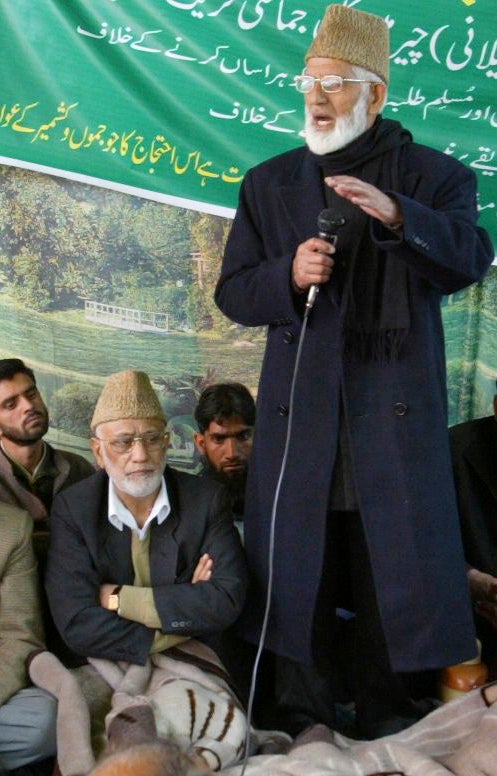Staunch anti-India Kashmir politician dies in police custody
A prominent politician in Kashmir who challenged India’s rule over the disputed region for decades has died while in police custody

Your support helps us to tell the story
From reproductive rights to climate change to Big Tech, The Independent is on the ground when the story is developing. Whether it's investigating the financials of Elon Musk's pro-Trump PAC or producing our latest documentary, 'The A Word', which shines a light on the American women fighting for reproductive rights, we know how important it is to parse out the facts from the messaging.
At such a critical moment in US history, we need reporters on the ground. Your donation allows us to keep sending journalists to speak to both sides of the story.
The Independent is trusted by Americans across the entire political spectrum. And unlike many other quality news outlets, we choose not to lock Americans out of our reporting and analysis with paywalls. We believe quality journalism should be available to everyone, paid for by those who can afford it.
Your support makes all the difference.A prominent politician in Kashmir who challenged India’s rule over the disputed region for decades died Wednesday while in police custody. He was 78.
Mohammed Ashraf Sehrai was admitted to a government hospital with multiple ailments on Tuesday from a jail in the southern Jammu region, officials and his family said.
Sehrai’s son, Mujahid Sehrai, said his father was denied proper medical care while in jail. He said he spoke to his father 10 days ago and he complained of ill health.
“He told us several times in the last few months during his two phone calls a week to home that he was not getting proper medical treatment,” his son said. “We moved to a court on April 16 with a petition seeking proper medical assistance for him but the court was yet to review it.”
Authorities did not immediately announce the cause of death. However, his son said doctors said his oxygen levels had dropped early Wednesday.
Sehrai was arrested last July under the Public Safety Act, which allows authorities in Indian-controlled Kashmir to imprison anyone for up to two years without trial.
All Parties Hurriyat Conference, the main separatist grouping in Kashmir, said authorities had left Sehrai unattended in jail until his condition worsened. In a statement, it said it “deeply regrets this inhuman attitude of the authorities and is pained by it.”
It also expressed concern about the health of hundreds of other Kashmiri political detainees as India faces a massive health crisis because of an explosion of coronavirus cases. Last week, the grouping said the prisoners were being denied “even basic amenities,” leading to “serious health problems among the prisoners.”
Sajad Lone, a pro-India Kashmiri politician, called Sehrai a “transparently honest politician.”
“Have we become so weak that an old infirm dying person is a threat to the state?” he said in a tweet.
Moeed Yusuf, national security adviser to Pakistan’s prime minister, said he was “deeply saddened” by Sehrai’s death. “He dedicated his life for Kashmir’s self-determination. Many more Kashmiri leaders are at risk,” Yusuf said in a tweet. “It is India’s responsibility to release all those detained on political grounds to create conducive environment.”
India has arrested thousands of Kashmiris under the Public Safety Act since 1989, when an armed rebellion erupted in Indian-controlled Kashmir seeking the region’s independence or merger with Pakistan which controls another part of the territory. Rights groups say India has used the law to stifle dissent and circumvent the justice system, undermining accountability, transparency, and respect for human rights.
Sehrai was one of the staunchest supporters of Kashmir’s merger with Pakistan. He was head of Tehreek-e-Hurriyat, an anti-India political group, and a member of the largest religious and political group, Jama’at-e-Islam.
He spent more than 16 years in various Indian jails in a political career that spanned nearly six decades. His son was killed in a gunfight with Indian troops in April last year in the region’s main city of Srinagar He was member of Kashmir’s main rebel group.
Mohamad Junaid, a New York-based Kashmiri political anthropologist, said “there is no difference between killing and actively creating the conditions of someone’s death.” In a tweet he said, “When a state can’t take care of its own people, how could it ever look after the health of political dissidents it has declared as enemies and imprisoned?”
Sehrai is survived by his wife, two daughters and three sons.